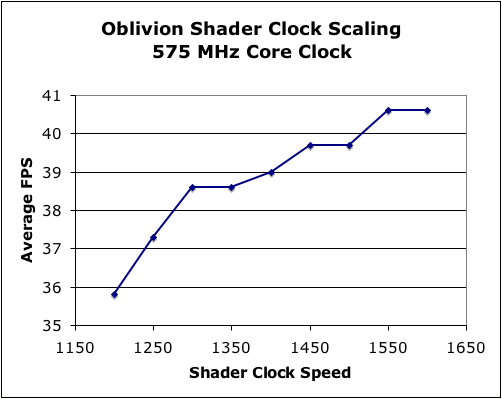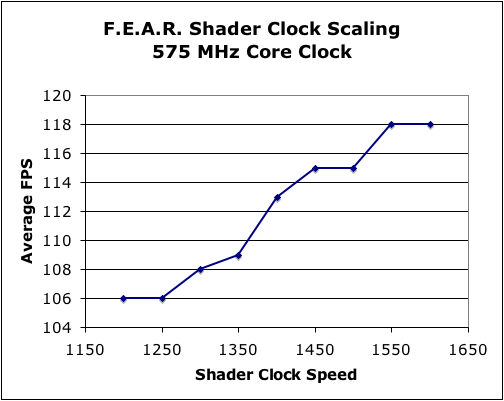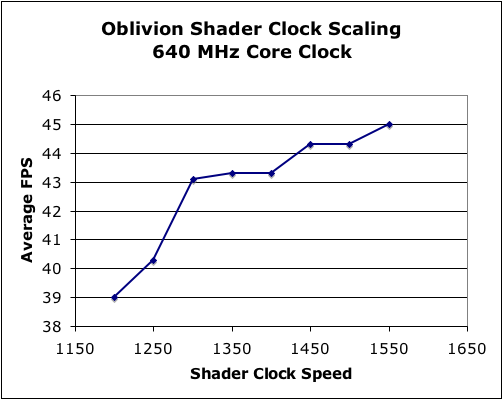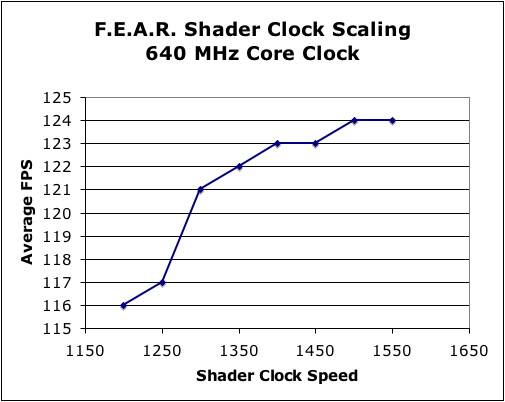Performance Scaling with OCZ's 8800 GTX
by Derek Wilson on February 16, 2007 11:00 AM EST- Posted in
- GPUs
GeForce 8800 GTX Shader Clock Scaling
For shader clock scaling, we've performed two sets of tests. In one test, we've left the core clock at the stock 575 MHz, and in the other we are running 640 MHz. In both cases, memory speed is fixed at 1020 MHz. Not only do we get a sense of what to expect when overclocking both shader and core clock at the same time, but we can get a better idea of how shader clock impacts performance in the 8800 GTX.
Our test scenarios are the same as in our core clock speed scaling tests. Shader clock is adjusted in 50 MHz increments from 1200 to 1600. Unfortunately, the combination of 1600 MHz shader and 640 MHz core clock just wasn't stable enough to complete any of our tests, but we still have enough data to understand more about what's going on.

Just looking at the graph tells us that increasing shader clock does have an impact on performance. Digging a bit deeper is unfortunately a little disappointing. If we look at the percent improvement in performance from stock to maximum, we see only about a 5.2% increase. The percent increase in shader clock speed is actually 18.5% from stock to maximum. Shader clock speed has much less impact on Oblivion than core clock speed.

F.E.A.R. does respond a little better to shader overclocking than Oblivion, but even at 8.3% improvement at 1600 MHz, F.E.A.R. performance doesn't even improve at half the rate shader clock speed is increased. Like Oblivion, F.E.A.R. benefits much more from increasing core clock speed.

When we run our overclocked core speed with variable shader clocks, we do get higher performance in general. As far as scaling goes, at the 1550 MHz shader mark, which is a 14.8% increase in shader frequency, we only net a 3.9% performance increase. Yes, total performance is higher than just overclocking either the core or the shader, but it is very clear which has the greater impact on Oblivion performance.

Once again, we see a similar situation in F.E.A.R. with performance improving only slightly as shader clock is increased with a 640 MHz core clock. This time, though, we don't see any better performance than with just the core overclocked at stock shader clock speeds.
For shader clock scaling, we've performed two sets of tests. In one test, we've left the core clock at the stock 575 MHz, and in the other we are running 640 MHz. In both cases, memory speed is fixed at 1020 MHz. Not only do we get a sense of what to expect when overclocking both shader and core clock at the same time, but we can get a better idea of how shader clock impacts performance in the 8800 GTX.
Our test scenarios are the same as in our core clock speed scaling tests. Shader clock is adjusted in 50 MHz increments from 1200 to 1600. Unfortunately, the combination of 1600 MHz shader and 640 MHz core clock just wasn't stable enough to complete any of our tests, but we still have enough data to understand more about what's going on.

Just looking at the graph tells us that increasing shader clock does have an impact on performance. Digging a bit deeper is unfortunately a little disappointing. If we look at the percent improvement in performance from stock to maximum, we see only about a 5.2% increase. The percent increase in shader clock speed is actually 18.5% from stock to maximum. Shader clock speed has much less impact on Oblivion than core clock speed.

F.E.A.R. does respond a little better to shader overclocking than Oblivion, but even at 8.3% improvement at 1600 MHz, F.E.A.R. performance doesn't even improve at half the rate shader clock speed is increased. Like Oblivion, F.E.A.R. benefits much more from increasing core clock speed.

When we run our overclocked core speed with variable shader clocks, we do get higher performance in general. As far as scaling goes, at the 1550 MHz shader mark, which is a 14.8% increase in shader frequency, we only net a 3.9% performance increase. Yes, total performance is higher than just overclocking either the core or the shader, but it is very clear which has the greater impact on Oblivion performance.

Once again, we see a similar situation in F.E.A.R. with performance improving only slightly as shader clock is increased with a 640 MHz core clock. This time, though, we don't see any better performance than with just the core overclocked at stock shader clock speeds.










12 Comments
View All Comments
acejj26 - Friday, February 16, 2007 - link
is it a combination of warranty and guarantee?DerekWilson - Friday, February 16, 2007 - link
Sorry, I typed the word for the person to whom a warranty is given, thus the spell checker failed me. Thanks for the catch.